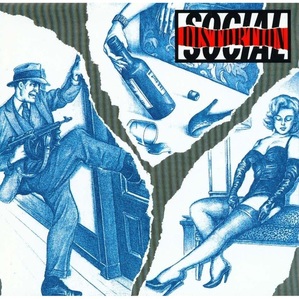Despite the bluesy punk shift in instrumentation, it is in the lyrics where Mike Ness may have accidentally spoken an axiom of the human condition on a spiritual level. On live recordings, Ness has even referred to “Ball and Chain” as “a forceful cry, a lament, a plea, or ‘a folk prayer’. The last definition, a ‘folk prayer’, is where the heart of the matter lies concerning Social Distortion’s hit. Or rather, “Ball and Chain” is the universal ‘prayer’ of the human soul toward its creator.
The analysis lies in the verses. The first verse reads: Well it's been ten years, and a thousand tears And look at the mess I'm in A broken nose and a broken heart An empty bottle of gin Well I sit and I pray In my broken down Chevrolet While I'm singin' to myself There's got to be another way It’s obvious the emotional state of the “I” in the song is reflective and at a crossroads in his/her life. The reference to “ten years and a thousand tears” is an examination of hardship and sorrow and then shifts to the present tense, “Look at the mess I’m in” which asserts the current state of the singer is one of disarray, despair, and hopelessness, continuing, he/she further illustrates the despondency by showing us “an empty bottle of gin.” The setting of the present state now gives us an image of isolation and claustrophobia as the singer sits in his/her “broken down Chevrolet.” Overall, the image painted and the words spoken are construed as rock-bottom due to circumstances of a self-inflicted mess. However, circumstances outside of one’s own volition could contribute to the hypothetical “mess” the singer has found himself in. Still, the reaction to such external consequences could have further motivated them down the path of a thousand tears. The striking moment is near the end of the verse where this level of desperation results in prayer (“I sit and I pray”) and an acknowledgment of his/her own fallibility (“There’s got to be another way”) or, perhaps, in correspondence with prayer, an acknowledgement of someone or something greater than oneself. Let’s continue to the second verse: Well I've searched and I've searched To find the perfect life A brand new car and a brand new suit I even got me a little wife But wherever I have gone I was sure to find myself there You can run all your life But not go anywhere
Yet these societal standards of success or ‘the perfect life’ do little to alleviate the sense of longing inherent in the narrator and, in fact, act as an anesthetic to an unhealed, spiritual wound. Wherever the singer goes, the old issues and desperation followed, despite obtaining wealth, status, and travel. Regardless of the coats worn, the singer’s continuing poor decisions followed or, actually, never left. For nothing was altered internally within the narrator. Ony the external changed and, on a superficial level such as this, no true remedy can be found for a non-corporeal malady. The true lacking resides within the singer on a personal and ontological level of existence and purpose.
The last lines sum up the veracity of this verse: “You can run all your life, but not go anywhere.” The truth, for the narrator and humanity, is the decisions we make are cataclysmic and regardless of what we try to achieve or how far we distance ourselves from our volitional circumstance, the same results will follow. In essence, these choices have rendered the lyricist stationary regardless of the miles traveled. So far, the singer has addressed living life according to an anti-theistic existence and attempting to find fulfillment through culturally defined guidelines only to realize no satisfaction has been found to satisfy the longing with the singer’s spirit. The final verse addresses one common and final strategy: Well I'll pass the bar on the way To my dingy hotel room I spent all my money Been drinkin' since a half past noon I'll wake there in the mornin' Or maybe in the county jail Times are hard getting harder I'm born to lose and destined to fail The final verse is rather tragic. The finality of the lyricist’s perspective is one of destructive surrender to his circumstance. He resorts to alcoholism to anesthetize himself from his reality, taking an escapist approach rather than confronting the turmoil churning inside of his spirit. Even more unsettling is the complete lack of interest in his/her own existence. The old punk rock axiom of nihilism has worked its way back into the lyricist’s life and, since the motto of the lyricist’s meaning is “I’m born to lose and destined to fail”, the path of destruction has been paved and he/she will take the keys toward an inevitable, hopeless, downfall.
Take away, take away
Take away this ball and chain I'm lonely and I'm tired And I can't take any more pain Take away, take away Never to return again Take away, take away Take away this ball and chain It is the chorus that is the cry of the heart, the plea of the soul. It is the acceptance of help, not from the physical realm, but from a higher power. In essence, Mike Ness is speaking on behalf of humanity. The prayer to “take away this ball and chain” displays an incredible vulnerability and abandonment of the self in search of divine guidance. For the plea of the lyricist seeks out a force greater than oneself. All of us have our ball and chains, our hardships and poor choices, and it is simply and powerfully spoken by the singer like a communal prayer for the masses. It is an ambiguous command but we have to ask: Who is he asking? The only logical answerer is God. A spiritual being who supercedes the corporeal world and is the only one capable of truly taking away the regret, shame, guilt, and other negative associations related to the frivolous attempts at a self-sustaining life where our happiness and purpose are defined of our own volition. According to the verses, such a life has lead the lyricist to the brink of suicide. As the final verse explores, the narrator takes the final, logical step toward alcohol or self-medication with an abandonment of the consequences. He spends all his money on attempts to inebriate his internal struggles or to fill the resident void in his soul through escapism. This escapism leads to a self-definition as someone “born to lose and destined to fail.” Sadly, an acceptance of his own worthlessness. However, it is the prayer that ends the song. The lyricist could easily end the song and provide us with a hopeless melodrama where there is no future or redemption. But what is so striking is the repetition of the “urban prayer” exhorting a higher power for deliverance. Whether Mike Ness was aware of the depth and profundity of his lyrics on such an ontological and spiritual level remains a mystery. Regardless, “Ball and Chain” is a prayer rooted in the heart of every individual, whether theistic or antitheistic, to seek a source outside of one’s self. An autonomous existence will result in self-denigration and fulfillment connected to accomplishments and materialistic obsession. The cry of the human heart is not independence but dependence. True purpose is found in asking for help and acquiescing to the something outside of one’s self. Only through submission, can we be unshackled from our ball and chain. |
Info
"And there was a kid with a head full of doubt so I screamed til I died until all those bad thoughts were finally out." Archives
December 2017
Categories |


 RSS Feed
RSS Feed